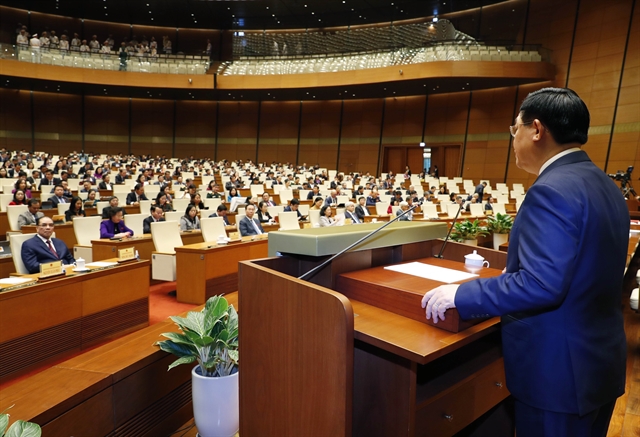 Politics & Law
Politics & Law
.jpg)

|
| National Assembly Chairman Vương Đình Huệ delivers closing remarks at the 15th NA's fifth extraordinary session on Thursday. VNA/VNS Photo Nhan Sáng |
HÀ NỘI — The 15th National Assembly (NA) wrapped up its fifth extraordinary session on Thursday at the NA building, highlighting the approval of the amended Land Law as one of its key legislative achievements.
Present at the closing session were State President Võ Văn Thưởng, NA Chairman Vương Đình Huệ, along with numerous Party, State and NA officials, as well as former leaders.
In his closing remarks, NA Chairman Vương Đình Huệ stated that after 3.5 days of work, the 15th NA’s fifth extraordinary session had successfully completed the entire agenda.
On behalf of the NA Standing Committee, NA Chairman Huệ summarised some of the session's outcomes.
The amended Land Law received approval from 432 out of the 477 NA deputies, accounting for 87.63 per cent of the total deputies.
Comprising 16 chapters and 260 articles, this law delineates the land ownership regime, rights and responsibilities of the state representing the collective ownership of the people over land. It also addresses unified land management, land use and management regimes, as well as the rights and obligations of citizens and land users concerning land within the country’s territory.
Except for certain specific provisions, the amended law will take effect on January 1, 2025.
NA Chairman Huệ stated that by passing the amended Land Law during this session, along with the amended Housing Law and the amended Real Estate Business Law in the previous 6th session, it has met the requirement to perfect a comprehensive set of policies and legal frameworks for the management and use of land suitable for the socialist-oriented market economy development direction.
This ensures that land resources are managed and used efficiently, sustainably, and with the highest effectiveness, he said.
"This is a valuable lesson in innovative thinking, working methods and resolute actions to continue improving the quality and efficiency of legislative work, as well as other NA resolutions," he said.
The NA Chairman proposed that the Government allocate resources, issue and implement specific plans to quickly bring the amended Land Law into life.
He urged the Government to direct relevant ministries and agencies to issue detailed regulations, intensify administrative procedure reforms related to land, and complete the construction of the interconnected national land information database.
The entire state land management apparatus needs to be streamlined, and decentralisation should be implemented in accordance with the law while existing challenges and obstacles related to land management and use, the land use rights market, and the real estate market should be efficiently addressed, he added.
Regarding the approval of the amended Law on Credit Institutions, NA Chairman Huệ stated that the law enhances the institutional framework in the banking sector, aligning it with the principles of the socialist-oriented market economy.
It meets the requirements for restructuring the system of commercial banks and credit institutions, ensuring the safety, stability and sustainability of the system.
The law includes provisions on the establishment, organisation, operation, early intervention, special control, restructuring, dissolution and bankruptcy of credit institutions and branches of foreign banks.
Additionally, the law covers the establishment and operation of representative offices in Việt Nam of foreign credit institutions and other foreign organisations engaged in banking activities. It further regulates the handling of bad debts and collateral assets of bad debts held by credit institutions, branches of foreign banks, and organisations fully owned by the State with functions of buying, selling and handling debts.
The law was approved by the legislature with 450 yes votes, or 91.28 per cent of the total NA deputies. Comprising 15 chapters and 210 articles, the law will be effective from July 1 this year.
NA Chairman Huệ also emphasised that the NA has approved a resolution on certain mechanisms and policies to implement national target programmes. This ensures the effective implementation of three national target programmes on building new rural areas, sustainable poverty reduction, and socio-economic development in ethnic minority and mountainous regions.
He suggested that the Government continue reviewing, amending and supplementing relevant documents to ensure consistency and conformity with this resolution.
Regarding financial and budgetary issues, the NA approved the allocation of nearly VNĐ64 trillion for tasks and projects in national defence, security, state management, science and technology, and transportation. Of this amount, almost VNĐ58 trillion would be allocated to 32 key transportation projects.
The top legislator said this would be a crucial prerequisite for expediting the implementation of key projects, contributing to achieving the goal of having more than 3,000 km of expressways by 2025.
Speaking at the press conference on Thursday, Permanent Member of the NA's Economic Committee Phan Đức Hiếu stated that the Government has submitted draft decrees, consisting of approximately 65 articles, to provide detailed guidelines for the implementation of the amended Land Law. The number of draft decrees may change during the implementation process.
Hiếu noted that the amended Land Law introduces many new points, focusing on five issues.
Firstly, the law includes regulations on the rights and legitimate interests of land users, such as expanding land use rights for Vietnamese citizens, including those residing abroad; and land policies for ethnic minorities.
Secondly, it addresses people's and businesses' access to land, such as regulations on land reclamation for socio-economic infrastructure construction, and for production and business activities. Additionally, it expands provisions related to land agreement mechanisms, land use purpose changes for land owners, and expands land funds for small and medium-sized enterprises.
Thirdly, the law focuses on improving land use efficiency by combining multiple purposes for land use and narrowing cases requiring permission when changing land use purposes.
Fourthly, it deals with land financial matters, such as separating land valuation issues from land support policies and implementing certain policies to stabilise land rent for production and business activities.
Finally, it aims to enhance the effectiveness and efficiency of state management, introducing various reforms and administrative procedure reductions to facilitate citizens.
In addition, Hiếu said the most crucial aspect is improving land data and information to make it easily accessible for the public, serving their daily lives and business activities, and improving mechanisms to make it more convenient for citizens to monitor the enforcement of land-related regulations. — VNS
.jpg)



